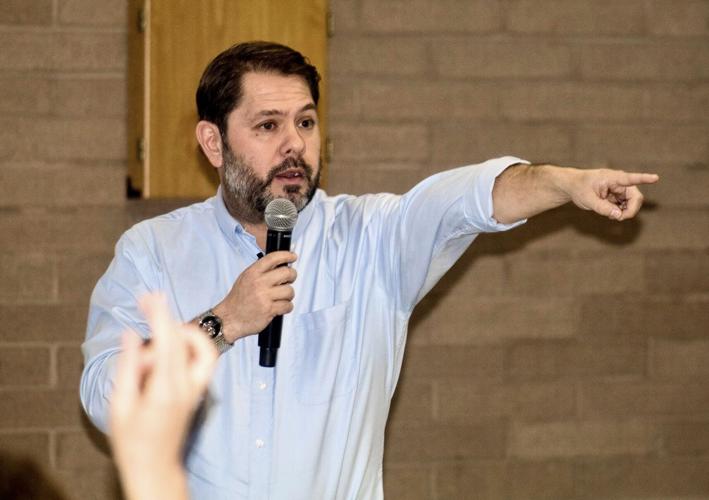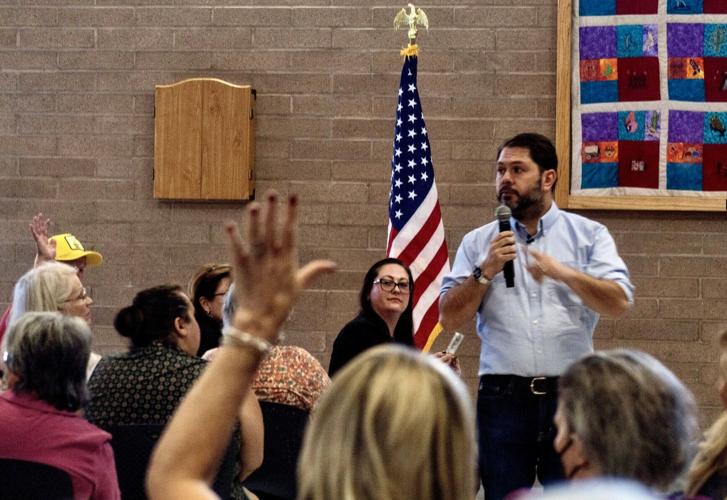
Sen. Ruben Gallego takes questions from residents concerned about rising healthcare costs during a town hall held at the Morris K. Udall Center and Carol West Senior Center in Tucson, Arizona, on Nov. 14, 2025. (Josie Shivers for Arizona Luminaria)
This story was co-published in partnership with CALÓ News and Arizona Luminaria.
TUCSON – Amid a partisan congressional battle over federal subsidies for affordable medical insurance, Pima County resident Karen Montgomery wants government leaders to focus on the bigger picture and advocate for healthcare for all. Her daughter lives in Norway, where residents have universal healthcare, she said.
“She pays high taxes, but both education and health care are covered,” she said. “And so there's no anxiety about whether you're going to be able to afford something, or whether you're going to have to go sit and wait and wait, and there's no reason why we can't do that.”
Montgomery was among nearly 100 residents who packed a room on the east side of Tucson on Friday afternoon to ask questions and share stories with Sen. Ruben Gallego, D-AZ, about what some categorized as a broken healthcare system.
Gallego held a town hall at the Morris K. Udall Center and Carol West Senior Center, where he addressed community concerns and discussed the expected increase in healthcare costs if Democrats and Republicans don’t come up with a resolution regarding Affordable Care Act (ACA) subsidies by December.
The town hall follows a legislative deal that ended the longest government shutdown in U.S. history, leaving unclear a resolution on the expiring ACA federal subsidies that have made health insurance less costly for millions of Americans.
The deal, agreed to by Senate Republicans and a handful of Democrats on Nov. 9, only guarantees a December Senate vote on the subsidies that come in the form of tax credits. Even then, House Speaker Mike Johnson, R-La, hasn’t agreed to a matching House vote on the issue, making the chances of an extension increasingly bleak.
If the two sides cannot agree, as many as 24 million people who get their health care from the exchanges created by the law could see their premiums go up Jan. 1.
Tucson Mayor Regina Romero, who introduced Gallego at the town hall, said “healthcare is a human right,” drawing cheers and applause from the audience.
“We need to make sure that someone is having the conversation,” Romero said. “Someone like Senator Gallego, because unfortunately, the person that represents this area, Juan Ciscomani, is not having this important conversation with us,” she added, referring to the Republican representative who has yet to hold a town hall meeting with constituents who will be affected by increased insurance costs and cuts to Medicaid and Medicare.
At the town hall, Gallego said his Republican colleagues want to repeal the Affordable Care Act, despite the significant impact it would have on the many people who would be affected by such a decision.
“The problem with that is this isn't a policy thing,” he said. “This isn't something you don’t just get to talk about in a theoretical world. You are affecting people's lives.”
He said that working-class people will have to choose between paying bills and paying for healthcare if costs increase. Like Romero, he also called out Ciscomani.
“It doesn't require that much courage for Juan Ciscomani or other Republicans to say, ‘I don't want this Band-Aid to get ripped off. I don't want hundreds of thousands of Arizonans overnight seeing their insurance premiums sometimes double,’” he added.

Sen. Ruben Gallego, D-AZ, responds to a Tucson community member at the Morris K. Udall Center and Carol West Senior Center in Tucson, Arizona, on Nov. 14, 2025. Gallego was there to answer concerns about rising healthcare costs. (Josie Shivers for Arizona Luminaria)
For Dr. Eve Shapiro, a longtime pediatrician and member of Physicians for a National Health Program present at the town hall, ensuring ACA subsidies remain affordable is a Band-Aid.
“I think these issues with Medicare, Medicaid and the ACA reveal inadequacy of our health care system and fail to cost, quality and access to care,” Shapiro told Gallego. “We need something different. We need improved Medicare for all.”
Gallego said that while he agrees the country should move toward universal healthcare, he wants to first address the ACA extensions and ensure that 24 million Americans are not immediately affected.
After the meeting, Shapiro told CALÓ News and Arizona Luminaria that she wanted to challenge Gallego, who had supported Medicare for All when he was a House representative but had since been quieter about whether he supports the current Medicare for All Act of 2025. She said seeing Democrats only focus on the ACA subsidies is “short-sighted.”
“It's the system, the underlying system, that is broken,” Shapiro said. “And it can be broken more at any point.”
Another audience member, a Tucson Medical Center surgeon, stated that the hospital receives calls for transfers from all over Arizona because rural hospitals lack the funding for adequate care for their residents. They asked if state leaders can do anything to address the issue if the federal government’s decisions lead to rural hospitals closing.
Gallego pointed to his experience as an Arizona state representative, where he worked with Gov. Jan Brewer and other elected officials, including Republicans, to expand Medicaid in Arizona. Gallego said states can explore ways to fill any gaps created by the federal government to prevent rural hospitals from closing.
One woman shared about her late-diagnosed, invisible disability that keeps her from being able to find a job, but because she’s high-functioning, she does not qualify for disability benefits. She said she’s worried she will lose her Medicaid after the federal budget bill passed earlier this year.
If the tax credits expire, enrolled Americans will face an average increase of 114% in their monthly premium payments, according to a report by KFF, a healthcare information organization. That’s in addition to steep spikes already expected in healthcare costs, with the amount that health insurers charge for coverage on the ACA Marketplace rising an average of 26% in 2026.
President Donald Trump signed the government funding bill on Nov. 12, ending a record 43-day shutdown that caused financial stress for federal workers who went without paychecks, stranded scores of travelers at airports and generated long lines at some food banks.
The enhanced healthcare subsidies, implemented during the COVID-19 pandemic, are set to expire at the end of the year unless Congress takes action.
Some moderate Republicans in the House have said they want to work with Democrats to extend the subsidies before the deadline, which is only weeks away. In a letter to Thune and Schumer on Wednesday, Pennsylvania Rep. Brian Fitzpatrick, the Republican co-chair of the Bipartisan Problem Solvers Caucus, encouraged negotiations.
“Our sense of urgency cannot be greater,” Fitzpatrick wrote. “Our willingness to cooperate has no limits.”
So far, though, Senate Republicans have been meeting on their own to figure out their own differences.
Some House Democrats have raised the possibility of another shutdown if they are unable to win concessions on healthcare. The bill signed by Trump will fully fund some parts of the government, but others will run out of money again at the end of January if Congress does not act.
Johnson called the subsidies a “boondoggle” immediately after the House voted Wednesday to end the shutdown. At the same time, Trump said the Obama-era health overhaul was a “disaster” as he signed the reopening bill into law.
It is far from the outcome that Democrats had hoped for during the shutdown, as they had demanded that Republicans negotiate with them on an extension before premiums were set to sharply increase. But they say they will try again as the expiration date approaches.
The Associated Press and Arizona Luminaria’s Carolina Cuellar contributed to this article.
Stephanie Casanova is an independent journalist from Tucson, Arizona, covering community stories for 10 years. She is passionate about narrative, in-depth storytelling that is inclusive and reflects the diversity of the communities she covers. She recently covered the criminal justice beat at Signal Cleveland, where she shed light on injustices and inequities in the criminal legal system and centered the experiences of justice-involved individuals, both victims and people who go through the system and their impacted loved ones.













(0) comments
Welcome to the discussion.
Log In
Keep it Clean. Please avoid obscene, vulgar, lewd, racist or sexually-oriented language.
PLEASE TURN OFF YOUR CAPS LOCK.
Don't Threaten. Threats of harming another person will not be tolerated.
Be Truthful. Don't knowingly lie about anyone or anything.
Be Nice. No racism, sexism or any sort of -ism that is degrading to another person.
Be Proactive. Use the 'Report' link on each comment to let us know of abusive posts.
Share with Us. We'd love to hear eyewitness accounts, the history behind an article.